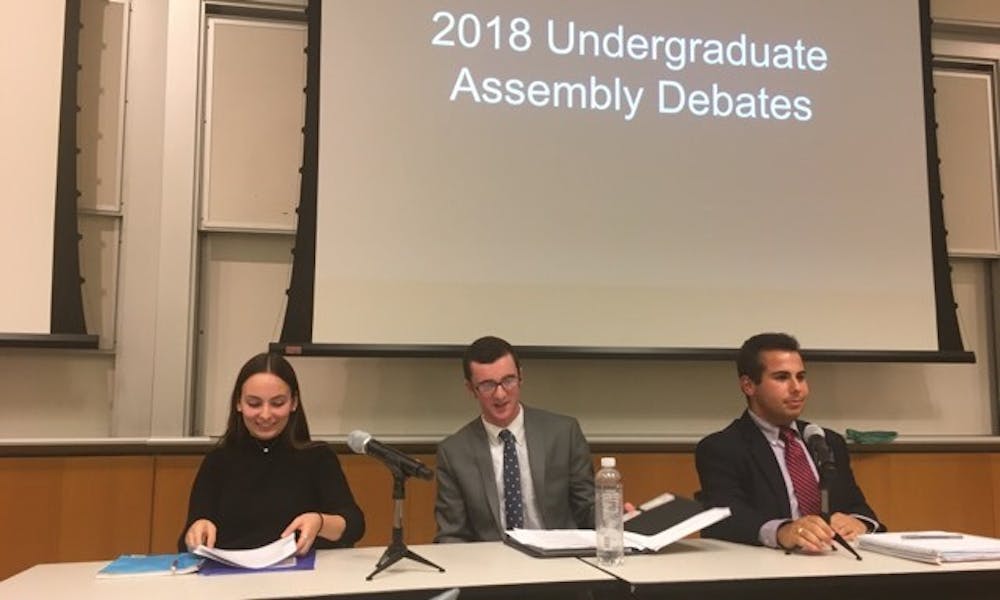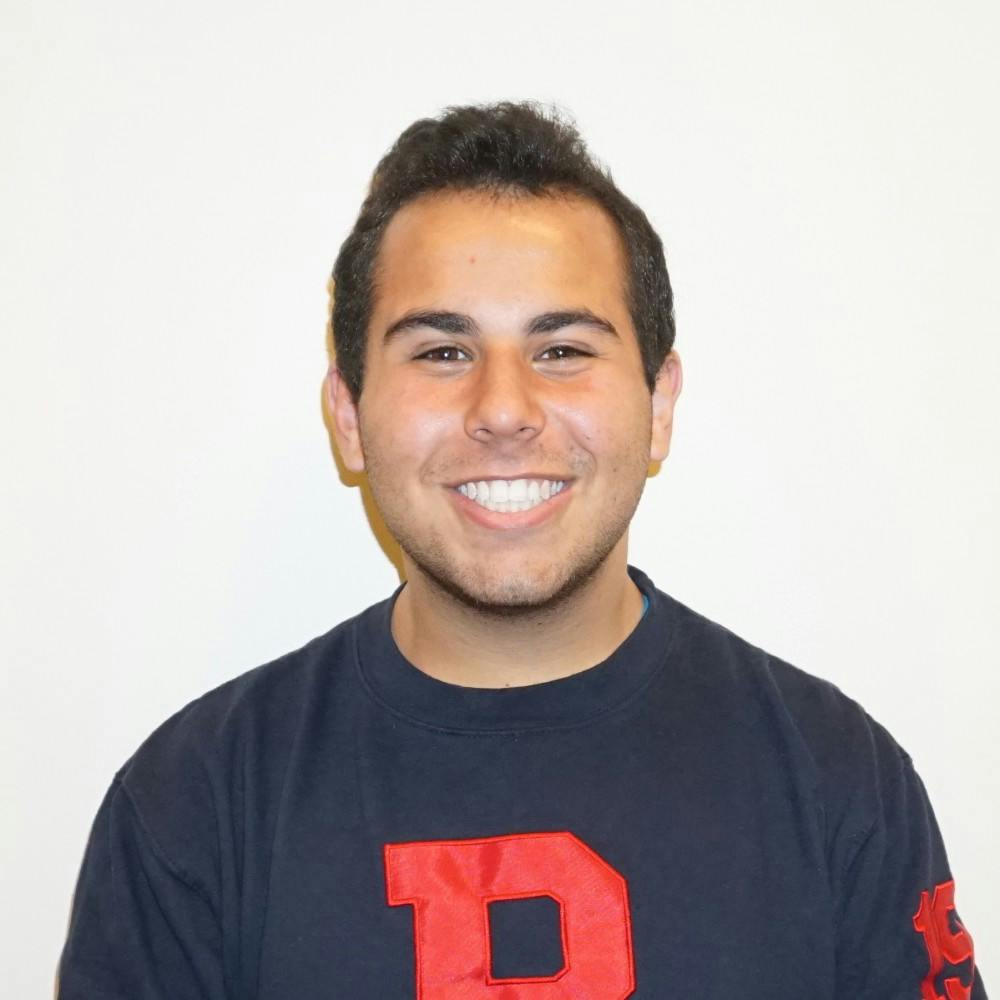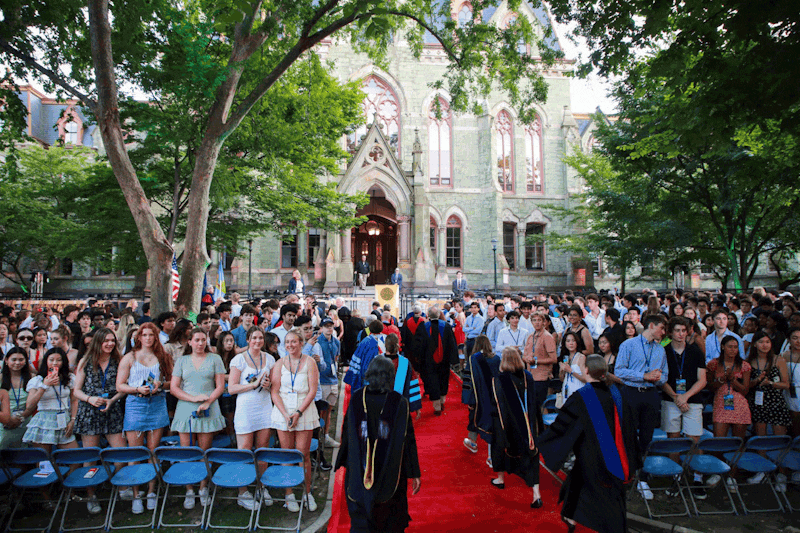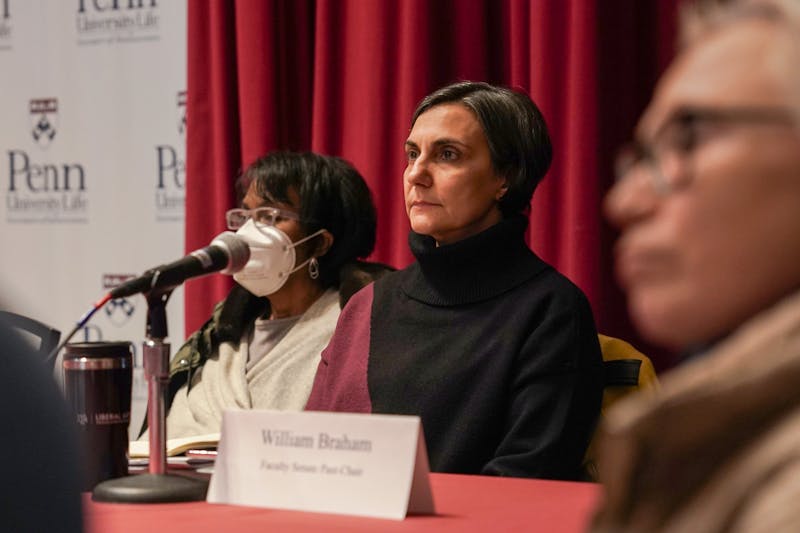
Aspiring student leaders took to the floor on Monday and Tuesday to debate hot-button issues ahead of the Undergraduate Assembly elections this week. In between discussing their platforms, student leaders raised a range of critiques on the current state of affairs, from University initiatives to school culture.
Addressing issues such as the price point of the new food hall Franklin’s Table and the ongoing controversy around Penn’s Asian American Studies Program, candidates often found themselves converging around similar talking points and positions.

On the first night of UA debates, the three UA presidential candidates College juniors Michael Krone, Samara Wyant, and Robert Klopf delved into their thoughts on Greek life, mental wellness and campus tragedies. On the second night, the students turned to social event registration policies and the ASAM program.
In their opening statements on both nights, both Krone and Wyant elaborated on their involvement with the UA at Penn while Klopf emphasized how he will bring a “fresh take” to the UA due to his lack of prior involvement.
During the debates, each candidate had the chance to answer questions prepared by the Nominations & Elections Committee as well as those submitted by the public on the NEC’s online survey and on a Facebook livestream of the event.
Mental wellness was a prominent topic of discussion on both nights of the debate.
“Mental health has been at the forefront of the UA agenda this past year and I think it needs to be that moving forward,” Wyant said.
Klopf suggested that Penn should emulate Harvard and Yale in implementing residential colleges for students, while Krone said that he and his running mate, College sophomore Jordan Andrews, plan to standardize advising services across all four schools and to provide access to “peer-to-peer support groups."

The candidates also discussed the role of the UA president in times of campus hardship, such as in the wake of student deaths and natural disasters.
Klopf said that the first priority of the UA president in times of hardship should be “open dialogue” and holding campus-wide events such as candlelight vigils.
“The role of the UA president is kind of the role of the student body president,” Krone said.
He added that he thinks it is extremely important for administrators to reach out to affected students “so that they don’t feel lumped in with the rest of the Penn community.”
In an investigative article last year, The DP found that there are often inconsistencies in the administrative protocol immediately following the death of student, resulting in some students mourning alone in the wake of a campus tragedy.
In the second debate, the candidates turned their attention to the controversy surrounding the Asian American Studies Program at Penn, which continues to face a lack of resources. A year after the former ASAM Program Director Grace Kao left the University, there is still no clarity from the administration on whether there is an active effort being made to replace her.
“I think the way that Penn has gutted the Asian American Studies Program as well as gutted the African Studies Program are just ways that Penn is saying to students on campus who want to major in ethnic studies, 'your academic interests don’t matter,' and I think that’s just not something that ought to continue,” Krone said.

Wyant emphasized the need to work with the ASAM Undergraduate Advisory Board to effect change.
“The UA has done some work on this in the past, but it has been largely ineffective, so moving forward, I think this is something we really need to defer to them on,” she said. “We want to be an ally for ASAM Undergraduate Advisory Board and for students who are taking these classes, and make sure we can work with them and with the guidelines that they are setting out to make sure that we’re not overstepping our boundaries,” she added.
Klopf seemed to suggest that the lack of resources faced by the ASAM program was associated with a more general mindset that students had towards their academics.
“I don’t know if the issue is with the importance of ethnic studies or if it’s with the larger problem of ‘are we more concerned with our academics and our learning and our liberal arts degree? Or are we concerned with our professional degree.’”
When asked what they felt is the most pressing concern facing the average Penn student, Krone and Wyant emphasized that there is no singular average Penn student.

Krone said that the biggest issue facing students is uncertainty “about what job you’re going to get after graduation, where your community is going to be at Penn.” He discussed the work he’s with done on the UA this year to restructure the club recruitment in order to reduce stress.
Klopf took a different approach, citing Penn’s biggest issue as competition.
“Competition creates an anxiety that’s not needed—you don’t need anxiety to perform at a high level, no matter what you may define that high level to be,” he said.
The VP candidates also took the floor this week.
Both College sophomore Jordan Andrews and Wharton sophomore Max Grove touched on mental health, but also discussed gentrification, anti-violence training for students, and issues facing first-generation low-income students.
“There is a huge culture of richness at Penn, especially with the new food hall [Franklin's Table] that was recently implemented,” Grove said. “I personally was vehemently against this food hall.”
Andrews agreed with Grove that there are issues with finding affordable retail and dining on campus, but also emphasized the importance of addressing high dues for clubs at Penn.
When discussing the newly passed alcohol and drug policies, neither Andrews nor Grove explicitly agreed or disagreed with the guidelines, but indicated that there should be more student feedback informing such policies.
On the second night, Krone, Wyant, and Kopf reiterated Andrews’ and Graves’s stance on these policies, but emphasized the need to work with the administration on improving transparency.
The debates on both nights ended with a lighthearted lightning round in which candidates had to respond to questions about their favorite dining hall, favorite Penn alumni, and favorite administrator to work with in five words or less.
One of the questions asked was, “If you were a college house, which one would you be?”
Andrews said that she would be New College House “because ideas,” while Grove said that he would be The Quad “because collaboration.”
The Daily Pennsylvanian is an independent, student-run newspaper. Please consider making a donation to support the coverage that shapes the University. Your generosity ensures a future of strong journalism at Penn.
Donate











